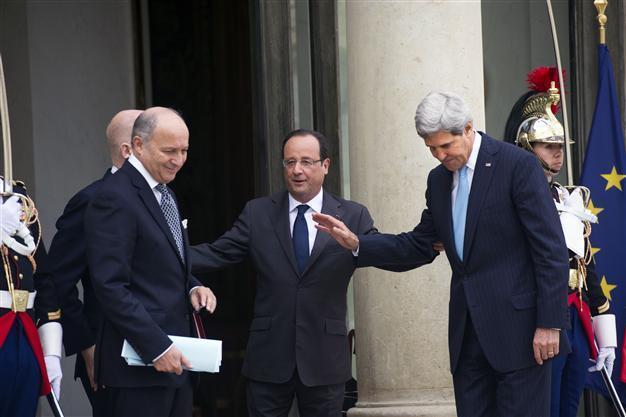US, France, Britain to press Assad on chemical arms
PARIS - Reuters

French President Francois Hollande (C) speaks with US Secretary of State John Kerry (R), next to French Foreign minister Laurent Fabius (L), after a meeting at the presidential Elysee palace on September 16, 2013 in Paris. AFP photo
The United States, France and Britain agreed Sept.16 to step up pressure on President Bashar al-Assad to stick to the terms of a deal under which Syria is to give up its huge arsenal of chemical weapons and avoid U.S. military strikes.The three Western permanent members on the United Nations Security Council agree to seek a strong resolution in that forum that sets binding deadlines for the removal of Syria's chemical weapons, French President Francois Hollande's office said.
The statement followed talks in Paris, two days after the United States reached a deal with Assad's ally Russia on chemical weapons that could avert U.S. strikes on Syria.
U.S. Secretary of State John Kerry told a news conference in Paris that the three powers agreed with Moscow that Assad must suffer consequences if he fails to comply with U.N. demands. The accord offered the Syrian leader "no lifeline" and he had "lost all legitimacy", Kerry added.
After Hollande met Kerry and British Foreign Secretary William Hague and their French counterpart Laurent Fabius, an aide to Hollande said: "The idea is to stick to a firm line."
"They've agreed to seek a strong and robust resolution that sets precise and binding deadlines with a calendar," said the official, who spoke on condition of anonymity.
Syria's government at the weekend hailed as a "victory" the Russian-brokered deal, which rebels who have been fighting to overthrow the government in Damascus since 2011 says has benefited their enemy in the civil war.
Assad briefly dispersed his forces to protect them from strikes threatened by the United States as punishment for a chemical weapons attack in Damascus on Aug. 21 which Washington says killed more than 1,400 people, many of them children.
Government jets and artillery hit rebel suburbs of the capital again on Sunday in an offensive that residents said began last week when President Barack Obama delayed air strikes in the face of opposition from Moscow and in the U.S. Congress.
The deal reached in Geneva has put off the immediate threat of air strikes but Obama has stressed that force remains an option if Assad reneges. U.S. forces remain in position.
Russia still opposes military action but now backs possible U.N. sanctions for non-compliance.
















